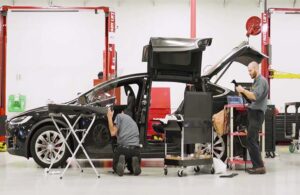Looking at the high jump in electric vehicles market, Inter-Industry Conference on Auto Collision Repair (I-CAR) has started offering a five-day hands-on electric vehicle (EV) course at its new Chicago Technical Center (CTC) in Vernon Hills, Illinois.
 The EV course will be taught by I-CAR’s “bench of EV experts” and will serve as the capstone to eight prerequisite EV courses for collision repair professionals.
The EV course will be taught by I-CAR’s “bench of EV experts” and will serve as the capstone to eight prerequisite EV courses for collision repair professionals.
I-CAR Technical Products and Curriculum Director Bud Center have explained that the hands-on course is “designed to address large knowledge and skill gaps in the collision repair industry” with the right space, tools, equipment, and personalized instruction “to build skills proficiency.”
“This is all followed by written and practical (hands-on) exams to ensure the learner has the knowledge and skill necessary to perform complete, safe, and quality repairs in this area,” he said.
I-CAR Director, Technical Programs and Services Dirk Fuchs said in a news release that the course’s personalized, and onsite instruction will “help technicians gain the confidence and competence needed to help inspect and repair today’s EV and hybrid vehicles aligned with OEM-specific procedures and high voltage safety best practices.”
“Our state-of-the-art EV Lab at the CTC offers the ideal learning environment, as it is designed to include all of the appropriate tools, equipment, and space, along with expert instruction necessary to guide individuals towards safety and proficiency in all aspects of the EV repair process,” he said.
Center said the course will initially only be offered at the CTC because it has the appropriate space, tools, and equipment “to optimize the learning experience.”
“Electric vehicles are here and manufacturers are committing to an increased amount of EVs on the road in the future,” Center said. “Therefore the knowledge is necessary now for a complete, safe, and quality repair. The I-CAR courses are not intended to replace OEM training. These online courses provide collision repair professionals with the foundational knowledge they need to safely perform repairs on electric vehicles. This also allows learners to be better prepared for vehicle maker-specific training by providing the foundational knowledge and skill before attending the vehicle maker-specific training so it is a more efficient and effective learning experience.”
EV safety instruction includes learning how to safely disconnect high voltage systems, confirm zero potential, and initialize high voltage systems following repairs and service.

